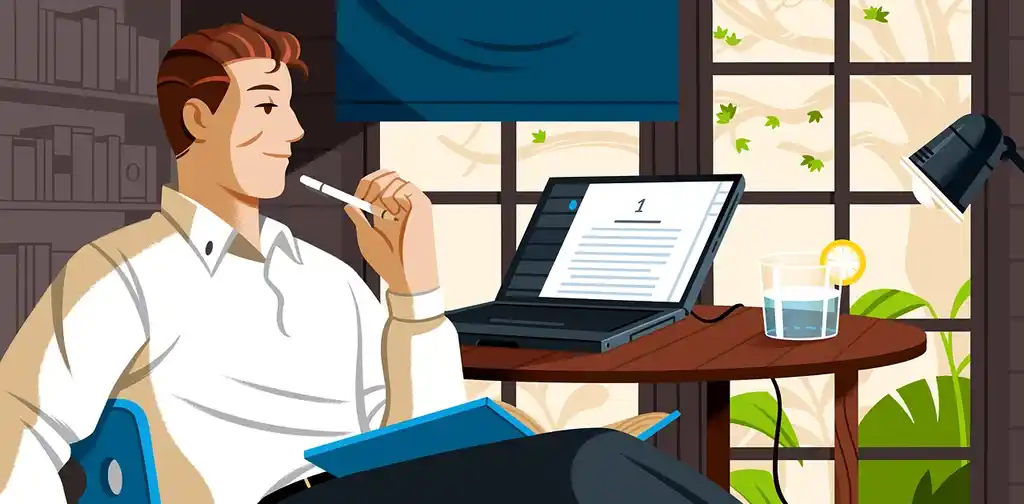Blog •
Posted on Jan 13, 2019
The Career I Didn’t Know I Wanted: A Ghost’s Perspective
About the author
Reedsy's editorial team is a diverse group of industry experts devoted to helping authors write and publish beautiful books.
More about the Reedsy Editorial Team →Savannah Cordova
Savannah is a senior editor with Reedsy and a published writer whose work has appeared on Slate, Kirkus, and BookTrib. Her short fiction has appeared in the Owl Canyon Press anthology, "No Bars and a Dead Battery".
View profile →This article was written by Barry Napier, an author and ghostwriter with Reedsy. In this guest post, he reveals how he came to write from the shadows...
I first knew I wanted to be a writer when I was twelve years old. I'd just finished reading Stephen King’s ‘Salem’s Lot, and by the time I reached the final page, I felt sure that I had found my calling.
I received my first rejection letter for a short story at the age of fourteen. I had another dozen or so by the time I was sixteen — so I also understood, from an early age, that writing is a career filled with rejection.
This was something I looked back on as I got older and started submitting novels to agencies and small publishers. As I continued to pursue my dream of writing fiction, I experienced rejection constantly. Most of the time, I had to work other jobs to supplement my income. I was working as an editor and past performance writer for a telecommunications company when my first novel was published.
It took less than a year after this to realize that my dream was not all that I thought it was. When you’re making more money on a single short story sale than you earn in a whole year of book royalties, you realize you need to reevaluate your life choices. So I took to the Internet to figure out what else I could do to build my career as a writer.
Exploring other options
I realized that my fiction writing alone wasn’t going to cut it. However, writing proposals for a telecommunications company was about as exciting as it sounds. So I started to hunt around Craigslist and local want ads for copywriting positions. It still wasn’t exactly what I had envisioned in terms of my writing career, but it was fun for awhile and brought in some extra income.
Over the next five years or so, I managed to publish twenty short stories in addition to copywriting, and roughly the same number of poems. Before I knew it, I had written another novel and two more poetry collections! While I was far from the bestselling author I wanted to be when I was younger, I'd started building a unique and dedicated resume, from my copywriting work to my creative poetry and fiction.

JOIN REEDSY
Find exciting new projects
We connect publishing professionals with our community of 1,500,000 authors.
In other words, things were going pretty well. So well that my wife and I purchased a new house. A bigger house. A more expensive house. With our combined salaries, it all seemed to be sunshine and rainbows.
Then three weeks later, just after we’d finished arranging the furniture, my main job laid me off. I went into panic mode, thinking about my now-much-larger mortgage.
Immediately, I started sending emails to old copywriting clients. I got a few nibbles but nothing substantial. More time passed and we started drowning in bills. Eventually, I realized that I would have to scrape the bottom of the barrel just to get by.
I took copywriting jobs that paid peanuts. I bid ridiculously low on freelance bidding sites just to land jobs that didn’t interest me, just because they'd bring in a little money. Basically, I wrote whatever I could to make ends meet. But I was stressed and miserable, and still hadn’t found what I really wanted to be doing as a writer.

Getting into ghostwriting
Then one day, I started looking into ghostwriting jobs. I had never considered it before; something about writing someone else’s story seemed both sordid and intrusive to me.
I can’t say the world of ghostwriting made a great first impression on me. For one thing, there were tons of people trying to rip off the success of Fifty Shades of Gray — but these people weren’t even as enterprising as E.L. James. They were non-writers, hoping for some poor sucker to write a 50,000-word book for $1,000 or less so they could leech off James' success.
For another, the power of Amazon and ebooks had many people thinking they could get rich overnight. And they were looking for ghostwriters to get it done for them, so they wouldn’t have to lift a finger. They wanted writers they could exploit by paying them practically nothing. Then they'd scoop up all the credit for the book when it came out.
I mention the Fifty Shades hopefuls and overnight success wannabes not to scoff, but to demonstrate how bleak the ghostwriting market can seem. Still, I used my publishing credits (some from fairly reputable publications) and my unique work history to get jobs like these — even though I still didn't plan on making a career out of it.
I worked for practically nothing, churning out 40,000 word novels in a month just to make a $1,000 profit. I was that desperate. Even then, as I was starting out in ghosting, I knew it was dismal pay. But I was in no position to complain.
At my lowest point, with bills piling and dread sinking in, I wrote a 25,000 word vampire novella for a mere $350.
You can judge. I would understand. Luckily, my story does not end here.
Becoming a successful ghost
Eventually, my perseverance paid off. After a year and a half or so, I started to noticed something: people were giving me great reviews on my bid site of choice. And because I was still doing some copywriting and editing in addition to those quick-turn novels, the number of reviews was climbing quickly.
Soon I ranked in the top 10% of that site, with 98% 5-star ratings from clients. Instead of hunting for jobs, I now had clients coming to me. In fact, I had to turn many of them down! This is one of the harder parts of becoming a successful ghost. But of course, it’s great to have the job security of knowing you can work more if needed.
My high ratings attracted the attention of people that browsed the site for talent. Before long, I was getting offers for much more than the peanuts I'd been living on for the past year. I landed two clients that kept me consistently busy after that — one of whom remains a loyal client to this day.
I also piqued the interest of a ghostwriting talent pool that added me to their service. Through them, I landed my first pro-rated ghostwriting job and started networking with professional ghosts that showed me the ropes.
Part of this network involved a Facebook group where someone brought up Reedsy, back when they were still a brand new service. I contacted them right away, went through the application process, and have been very fortunate to become a part of their marketplace too.
Over the course of these past six or seven years, I have also dabbled in self-publishing myself. I’ve published four more novels and become an international author in the process. So while I have yet to share shelf space with Stephen King — which, if I’m being honest, continues to be a dream of mine — ghostwriting has allowed me to explore some pretty exciting personal projects, and I’m very happy with the way things have gone so far.

My top 3 ghostwriting tips
I know there are tons of ghostwriting tips, tricks, and how-to's out there about how to make a living with your writing. But for those who are serious and willing to work for it, here are the three critical insights I’d share:
1. Keep your nose to the grindstone
If you’re just starting out and don’t have much of a resume to your name, work hard and keep your initial expectations low. Ghostwriting is just like any other career. Expect to start at the bottom and work your way up. However, know that pride in your work and a degree of patience will likely allow you to skip a few rungs on the ladder.
2. Be open to different projects
Even if you see yourself as a fiction writer and only a fiction writer, don’t pass by potential projects that would help you grow as a writer in general. In the course of my career, from those first copywriting jobs to my current work, I’ve written everything from humorous articles for a pet website to the script for a mobile text-based game. I’ve written gritty thrillers and whimsical children’s books (something I never thought I’d do). And those children’s books were some of the best projects I’ve ever done! In other words: be adventurous and take some risks with your writing, because you never know where it could lead.
3. Remember that it's the client's story
As a ghostwriter, whether it’s just basic web copy or a novel, remember that it’s the client’s story. Of course, they might not have grown up with a love of storytelling like you and I did. So handle every project with immense respect, not just for the story, but for the client as well. It helps you approach the project more authentically from their perspective, plus it’s conducive to establishing a relationship that could lead to more projects in the future!
Indeed, as a ghostwriter (and writer in general), your career path will always be a little bit uncertain. I definitely struggled to get to where I am now, from losing my faith in certain projects to taking on projects I didn’t want just because I needed the money.
But if you keep at it, you too can find the writing niche that’s right for you. And the satisfaction of getting to do with you love — combined with the steady income of eventually finding a healthy pool of clients — will be 100% worth the grind to get to the top.
Barry Napier is an author and ghostwriter, specializing in thrillers, horror, adventure, middle grade, and Christian fiction. You can check out his Reedsy profile here.

FREE RESOURCE
The Full-Time Freelancer's Checklist
Get our guide to financial and logistical planning. Then, claim your independence.
